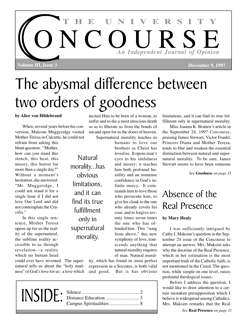Campus Spiritualities: Tongues in Scripture
by Gerald E. Hatcher
As I understand Mr. Weiner’s position in his recent contribution to the charismatic/traditionalist debate taking place in the Concourse, he is calling all Catholics to an acceptance and use of the charismatic gifts that are revealed to us by St. Paul in 1 Cor. 12:4-11, with what appears to be an emphasis on the charism of “speaking in tongues.” I agree with the teaching of the Church in this matter, but I find an unhealthy emphasis in Mr. Weiner’s article regarding the manifestation of “personal” tongues,1 which I fear is shared by many at FUS.
Mr. Weiner rightly quotes Sacred Scripture in his article with regards to 1 Cor. 12:11 (when he says that the gifts are “allotted as He, the Holy Spirit, wills”), but he errs in his presentation of 1 Cor. 14:5 by putting the emphasis on the speaking in personal tongues. This is clearly not the emphasis of St. Paul. St. Paul goes on in that same chapter to speak of how the Liturgy is for instruction and the building up of the Church and not for self-edification.2 The whole context of 1 Cor. 14 is to advise the Corinthians on what the conduct should be during the Liturgy. This chapter is an admonition to the Corinthians for their mis-use of the charismatic gifts.3 St. Paul further states that “all things [in the Liturgy] should be done for edification,” and that “if any speak in a tongue, let there be only two or at most three, and each in turn; and let one interpret”4 St. Paul also states that if there is no one to interpret, that the one who has the gift of personal tongues should “keep silence in the church and speak to himself and to God’”5 St. Paul concludes this chapter with these words: “So, my brethren, earnestly desire to prophesy, and do not forbid speaking in tongues; but all things should be done decently and in order.”6 [emphasis mine]
Another verse of Sacred Scripture that Mr. Weiner takes out of context is the quote of 2 Timothy 1:6-7. In this verse, St. Paul is not speaking of the gifts that we receive at Baptism or at Confirmation, but of the gifts that Timothy received at his ordination.
Mr. Weiner’s use of Pope John XXIII’s prayer is also inappropriate in the context of personal tongues in the Liturgy. First, because the event of the speaking in tongues on the “Day of Pentecost’” evidently did not happen during the context of the Lord’s Supper, so there is no basis there for an allowance of ‘personal’ tongues in the Liturgy. Second, the tongues that the Apostles and disciples spoke in were not personal tongues, but tongues that could be understood by the people around them.7
While I agree with Mr. Weiner’s statement that the gifts of the Holy Spirit should be encouraged in our daily lives and ministries, I cannot agree with his statement that they should be allowed (without due reason) in the Liturgy. I believe that Holy Mother Church and Sacred Scripture give us the best witness and understanding of how we should conduct ourselves during the Most Holy Sacrifice of the Mass. This understanding is to be truly communal, which means the edification and building up of the whole Church, not the self-edification of personal tongues.
In closing, I would like to state that I do not believe that is anything wrong with personal tongues; they are a true gift of the Holy Spirit and they should be gratefully recognized as such. But, not everyone receives this gift, for the Spirit distributes His gifts according to His will, not man’s. I believe that the proper place for personal tongues is in private prayer, not in a communal setting such as the Liturgy, for the reasons that I have stated above.
Gerald Hatcher, FUS class of ‘97, is currently enrolled in the STL program in Spirituality at the University of St. Thomas in Rome.
- What I mean by ‘personal’ tongues is not prophesy, but self-edifying tongues, or tongues of personal prayer; as St. Paul tells us in 1 Cor. 12:28 of the ‘speakers in various kinds of tongues’. ↑
- 1 Cor. 14:17-19—‘17For you may give thanks well enough, but the other man is not edified. 18I thank God that I speak in tongues more than you all; 19nevertheless, in church I would rather speak five words with my mind, in order to instruct others, than ten thousand words in a tongue’. [emphasis mine] ↑
- See Fr. Buckley, Apostle to the Nations, cf. pp. 295-300, where he speaks of the ‘boasting’ and pride of the Corinthians that St. Paul was addressing in Chapter 14. ↑
- cf. 1 Cor. 14:26-27. ↑
- 1 Cor. 14:28. ↑
- 1 Cor. 14:39-40. Mr. Weiner quoted this passage in his article, but he stopped his quote with vs. 39, which I believe takes this verse out of its proper context. ↑
- cf. Acts 2:6—where all were bewildered because each heard them speaking in his own language; and cf. Acts 2:17-21, where St. Peter refers this event to the prophesy of Joel, and he connects the speaking in tongues with prophesy. ↑


